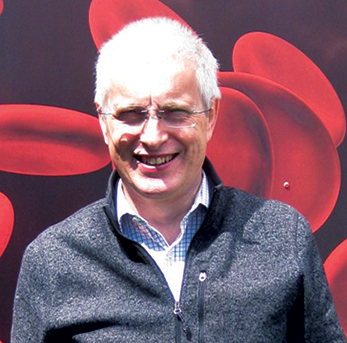UWA Changemaker - Professor Tim Inglis
School of Pathology and Laboratory Medicine
UWA and me

I have been connected with UWA since 1998 when I first took up an adjunct position in Microbiology, subsequently completing a PhD in addition to my clinical full-time job in 2003. During the last decade three members of my family have graduated from UWA, so that makes a total of four UWA degrees, or five if you count a Law/Arts double major. I took up an appointment with the School of Pathology and Laboratory Medicine in 2011 and established a Clinical Microbiology Translational Research Group.
Fighting antibiotic resistant bacteria
In short, we are developing a method to work out what antibiotics to use for serious infections much faster than the methods currently in clinical laboratory practice. Using a flow cytometer to analyse bacteria shortly after exposure to an antibiotic in question, we can determine how effective that antibiotic is as a treatment option. We aim to cut the time to knowing which antibiotic to use by at least 24 hours, and ultimately to make it possible to decide on treatment shortly after initial medical assessment. Resistant bacteria are chipping away at the 20 years antibiotics have added to our life expectancy over the several decades. Our team’s ultimate goal is to protect those years by providing evidence-based support for antibiotic prescribing decisions.
This year, our research group was awarded US$100,000 by the Bill & Melinda Gates Foundation to develop a screening test that will detect antibiotic resistance and ensure the right antibiotics can be prescribed. The Gates Foundation funds a pilot project which, if successful, will lead to faster and more accurate antibiotic susceptibility testing. I recently attended the annual scientific meeting of the Gates Foundation with other awardees and joined the antimicrobial resistance track, learning about projects in later stages of development. My team of researchers works on pathology laboratory capability development and mentoring the next generation of national and international clinical scientists. We have set up crowd funding to support this aspect of our work: Make AMR History.
Mentoring researchers from Sri Lanka
This November, the two organisations I work for are hosting a small group of Rotary-funded Sri Lankan clinical laboratory scientists who are in Western Australia for an immersion course in molecular diagnostic techniques. The four trainees are supplementing the knowledge they gained in June this year when Elin Turnbull and I ran an introductory workshop in Peradeniya, Sri Lanka as part of a Rotary International pathology laboratory capability building project. The advanced trainees are learning about methods used in WA to detect tropical infections such as melioidosis, leptospirosis and dengue; and about molecular markers of high profile antimicrobial resistance.
This work started in 2008 and has contributed to two completed PhD projects, a series of journal publications, grant applications and a national surveillance program. The antimicrobial resistance component is expected to feature in future work on the rapid susceptibility method my research team is developing with WA Health Department, Gates Foundation, Rotary and Lab Without Walls funding.
About Tim
Dr Tim Inglis is an Associate Professor with the School of Pathology and Laboratory Medicine UWA and a consultant microbiologist with PathWest Laboratory Medicine’s North Metro network. He heads a translational research group with interests in antimicrobial resistant sepsis and other emerging infectious diseases.